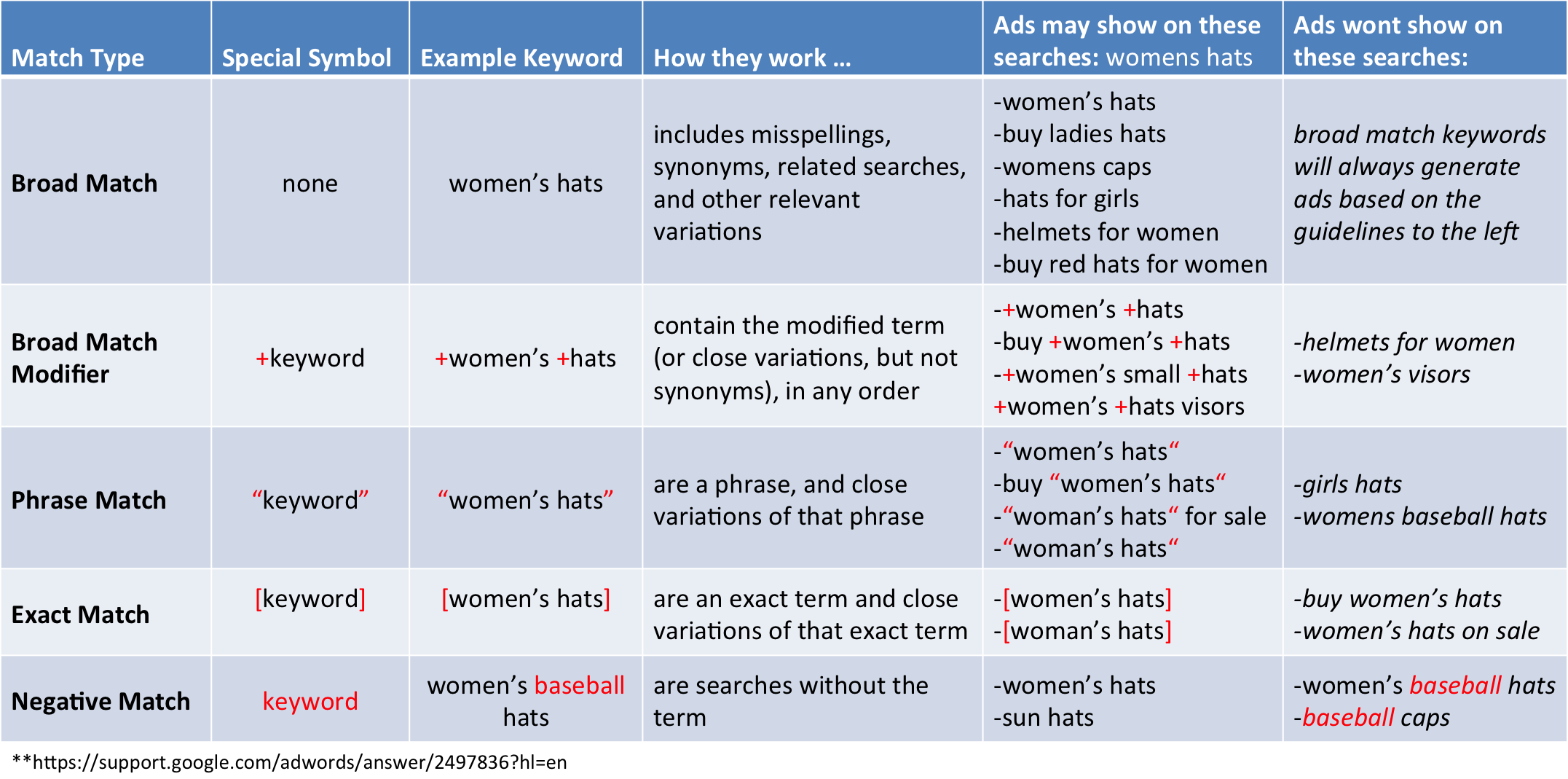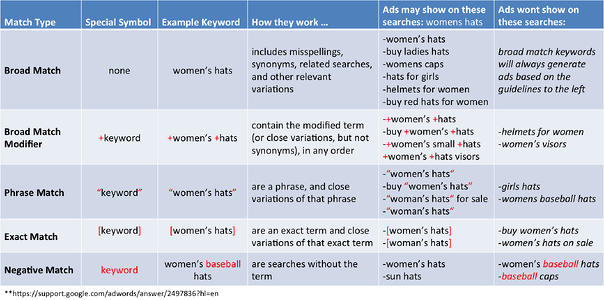A Simple Keyword Lesson for PPC: Match Types and Negative Keywords

Google determines when to show your paid search ads by indexing the search terms input by its users. It then matches these terms to the keywords in your PPC campaign. This matching algorithm can be specialized within a PPC campaign in order to optimize search results for your keywords.
Just thinking about keywords for your campaign can be an extremely daunting task. How do you know if the order of searched keywords matters? What if someone mispells your keyword? Could someone insert a word between two of your keywords?
These are all common keyword questions and Google has devised a simple solution - ‘Match Types’. The three main match types are Broad Match, Phrase Match, and Exact Match. These match types will allow you to better target your audience so that you can accomplish your personal PPC goals.

^Refer to this chart as a visual example of the concepts listed below.
Broad Match
This is the default match option. Google will show ads not only for this keyword, but also for relevant variations such as related search terms, synonyms, or if someone misspells the keyword. This is the easiest way to attract more visitors to your website and spend less time building keywords lists.
Broad match terms will generate higher traffic and will increase your daily spend. The broader the keyword, the higher the number of impressions. More impressions means more exposure, which ultimately leads to more clicks. Broad match keywords are great for PPC campaigns that have the ultimate goal of increasing traffic to a website.
Modified Broad Match
Modified broad match types, also known as mod broad, help you target your broad searches just a little bit better. Inserting a (+) before keywords in the campaign will tell Google that we want to show ads for related searches and close variants (misspellings, singular/plural forms, abbreviations acronyms, words insertion between the words) but not for searches that contain the modified term or lose variations, in any order.
Essentially it gives you more control than broad match and allows you to reach more people than phrase match.
Phrase Match
Phrase matches show ads when someone searches for your exact keyword or a close variation of it. It will also show ads for your keyword with additional words before or after it.
Using phrase matching is a simple way to better manage your budget because it will produce fewer impressions and generate ads for more targeted searches. Think of it as having “controlled reach” over your keyword searches.
Exact Match
Exact match is the most targeted match type and will only show ads when someone searches for your exact keyword or a close variation of it, such as a misspell.
Exact match makes searches highly specific. If you have a strict budget and only want to attract people who are highly interested in your content, exact match keywords are the strategic route to take. This is best for PPC campaigns that have the ultimate goal of creating a conversion on a website.
Because exact match is so targeted, you will spend more time coming up with ‘long tail’ keywords that will address your client’s search needs. These type of keywords are proven to convert better.
Negative keywords
By inserting negative keywords to your campaign you have the ability to prevent your ads for showing up on irrelevant searches. For example, if your keyword is ‘dallas hotel’, and someone searches for one of your direct competitors ‘dallas hotel marriott’ then your ad will show. By inserting ‘marriott’ as a negative keyword you disallow Google’s network from showing your ad. This prevents wasteful adspend and will increase your CTR.
Negative keyword and specific Match Type strategies will decrease impressions and increases more targeted clicks. This ultimately increases click through rates and conversion rates. A well build keyword campaign is a campaign manager’s bread and butter when it comes to targeting and conversion.
**AdVision Expert Tip – When building your keywords list, add a broad match, phrase match, and exact match version of each keywords so that you can test what type works better for your campaign. This experiment will allow you to live and learn match types and become a better paid search manager.
For more help with PPC feel free to download our eBook or contact us at the office!

September 18, 2013
